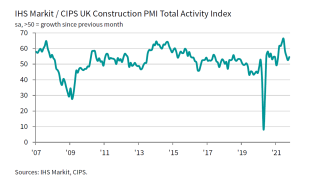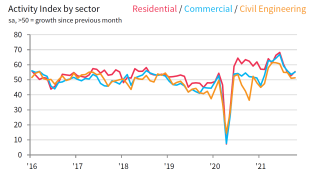The latest monthly survey of construction purchasing managers indicates that supply headwinds remain but the worst may, perhaps, be over.
Construction companies continue to report widespread supply constraints and rapidly increasing purchase prices, but these trends are their least severe since April.
The headline seasonally adjusted IHS Markit/CIPS UK Construction PMI total activity index registered a score of 54.6 in October, up from 52.6 in September. Anything above 50.0 indicates a growth in output and the index has now posted above that mark for nine consecutive months, hitting a peak of 66.3 in June.
House-building (index at 55.4) replaced commercial work (55.2) as the best-performing category of construction work in October. The latest increase in residential work was the strongest for three months. Commercial construction also expanded at a quicker pace than in September, with survey respondents citing a sustained boost from looser pandemic restrictions. Civil engineering activity (scoring 51.4) increased only marginally in October.
New order growth was unchanged from September's eight-month low and much weaker than seen on average during the summer, the survey found. Construction companies mostly commented on strong customer demand, but some suggested that supply shortages and escalating costs had hindered contract negotiations.
More than half of the survey panel (54%) reported longer delivery times among suppliers in October, while only 2% saw an improvement. Delays were overwhelmingly linked to lorry driver shortages and international shipping congestion. However, the number of construction firms reporting longer wait times for supplier deliveries was down from 63% in September and a peak of 77% in June.
Mirroring the trend for supplier delays, latest data signalled another steep rise in input costs, but the rate of inflation slipped to a six-month low. Around 73% of the survey panel reported an increase in purchase prices in October, which was attributed to rising energy and commodity prices as well as raw material shortages and a lack of transport availability.
Finally, the near-term outlook for construction growth remained positive in October. Just over half (52%) of respondents forecast an increase in output during the year ahead, while only 8% expect a decline. The degree of optimism improved slightly since September, despite some firms citing concerns about the impact of supply shortages and rising costs.

Tim Moore, director at IHS Markit, which compiles the survey, said: "UK construction companies achieved a faster expansion of output volumes in October, despite headwinds from severe supply constraints and escalating costs. House building showed the most resilience, as signalled by the fastest rise in residential work for three months.
"However, the volatile price and supply environment added to business uncertainty and continued to impede contract negotiations. As a result, the overall rate of new order growth was unchanged from the eight-month low seen in September.
"There were widespread reports that shortages of materials and staff had disrupted work on site, while rising fuel and energy prices added to pressure on costs. Nonetheless, the worst phase of the supply crunch may have passed, as the number of construction firms citing supplier delays fell to 54% in October, down from 63% in September. Similarly, reports of rising purchasing costs continued to recede from the record highs seen this summer."
Duncan Brock, group director at the Chartered Institute of Procurement & Supply, said: "Activity in the construction sector powered ahead in October with the fastest rise in purchasing for three months as builders continued their summer bounce into the autumn and resorted to forward buying and building stock levels.
"New order growth remained constant but increasing lead times from suppliers made commitment to contracted projects difficult because of the unpredictability of materials arriving on time as reported by over half of all supply chain managers. A slight moderation in input price inflation also gave hope to builders that price rises were receding, which could mean fewer delayed projects as costs were reviewed.
"With rising optimism and employment levels builders seem confident that the next 12 months will be rosier. However, with the squeeze on supply and staff shortages, it is far from guaranteed that uncertainty and instability are behind us just yet."
Got a story? Email news@theconstructionindex.co.uk





